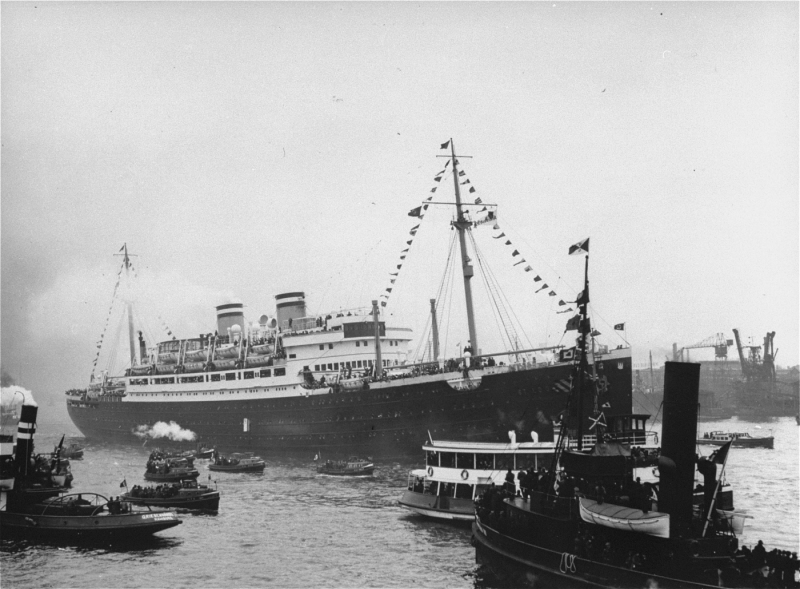
Jewish Refugees Desperately Seek Safe Harbor
The St. Louis was forced to leave Havana harbor. As the ship traveled up the Florida coast, passengers anxiously plead for refuge in the United States.
View newspaper articlesOn May 13, 1939, the German transatlantic liner St. Louis sailed from Hamburg, Germany, for Havana, Cuba. On the voyage were 937 passengers. Most were Jewish refugees who had applied for US visas, and had planned to stay in Cuba only until they could enter the United States. All passengers held landing certificates permitting them entry to Cuba, but unknown to the passengers, Cuban President Federico Laredo Bru had issued a decree just a week before the ship sailed that invalidated their documents.
When the St. Louis reached Havana on May 27, 1939, the St. Louis passengers were not permitted to leave the ship. Fewer than 30 passengers met the new visa requirement and were allowed to enter Cuba. The ship remained anchored in the Havana harbor for six days in the hope that the refugees would eventually be allowed to land. On June 2, 1939, the Cuban president insisted that the St. Louis leave. The ship headed north, so close to Florida that the passengers could see the lights of Miami. Some passengers cabled President Franklin D. Roosevelt asking for refuge. The President never responded. The State Department and the White House had decided not to take extraordinary measures to permit the refugees to enter the United States. US diplomats in Havana intervened once more with the Cuban government to admit the passengers on a "humanitarian" basis, but without success.
On June 6, 1939, the St. Louis was forced to turn back to Europe. Belgium, the Netherlands, England, and France agreed to admit the passengers, and on June 17, 1939, the St. Louis docked in Antwerp, Belgium. But within months, the Germans overran western Europe. Hundreds of passengers who disembarked in Belgium, the Netherlands, and France eventually fell victim to the Nazi "Final Solution."
The voyage of the St. Louis attracted a great deal of media attention. After Cuba denied entry to the passengers on the St. Louis, the press throughout Europe and the Americas, including the United States, brought the story to millions of readers throughout the world.
The St. Louis was one of several ships carrying desperate refugees fleeing Nazi Germany in 1939 and 1940. Two smaller ships carrying Jewish refugees had also sailed to Cuba in May 1939—a French ship, the Flandre, and a British vessel, the Orduña. Like the St. Louis, these ships were not permitted to dock in Havana. The Flandre turned back to its point of departure in France, while the Orduña proceeded to a series of Latin American ports. Its passengers finally disembarked in the US-controlled Canal Zone in Panama, and the United States eventually admitted most of them.
Learn More about this Historical Event
- Voyage of the St. Louis (Encyclopedia Article)
- Voyage of the St. Louis (Online Exhibition)
- Voyage of the St. Louis (Animated Map)
- Seeking Refuge in Cuba, 1939 (Encyclopedia Article)
- Refuge in Latin America (Encyclopedia Article)
- United States and the Holocaust (Encyclopedia Article)
Bibliography
Baumel, Judith Tydor. Unfulfilled Promise: Rescue and Resettlement of Jewish Refugee Children in the United States, 1934–1945. Juneau, AK: Denali Press, 1990.
Breitman, Richard, and Alan M. Kraut. American Refugee Policy and European Jewry, 1933–1945. Bloomington: Indiana University Press, 1987.
Feingold, Henry L., Bearing Witness: How America and Its Jews Responded to the Holocaust. Syracuse, NY: Syracuse University Press, 1995.
Gurock, Jeffrey S., ed. America, American Jews, and the Holocaust. New York: Routledge, 1998.
Hamerow, Theodor. While We Watched: Europe, America, and the Holocaust. New York: Norton, 2008.
Lipstadt, Deborah E., Beyond Belief: The American Press and the Coming of the Holocaust, 1933–1945. New York: Free Press, 1986.
Wyman, David S. Paper Walls: America and the Refugee Crisis, 1938–1941. New York: Pantheon Books, 1985.
Zucker, Bat-Ami. In Search of Refuge: Jews and US Consuls in Nazi Germany, 1933–1941. London: Vallentine Mitchell, 2001.
Search tips
These dates and keywords are associated with this historical event.